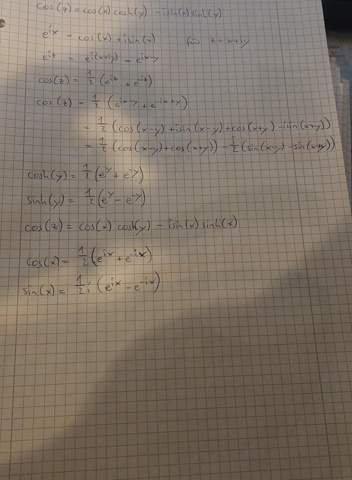Zeigen Sie dass cos(z) = cos(x) cosh(y) − i sin(x) sinh(y)?
Sei z = x + iy mit x, y ∈ R. Zeigen Sie, dass gilt:
cos(z) = cos(x) cosh(y) − i sin(x) sinh(y).

Problem/Ansatz:
Weiß nicht wie ich weitermache, soll ich cos und cosh in der euler form miteinander multiplizieren und ann sin und sinh in euler form miteinander multiplizieren und dann voneinander abziehen? da kommt dann aber irgendwie nicht cos(z) raus.
1 Antwort
Eulerformeln:
(a) sin(a) = 1/2*(exp(i*a) - exp(-i*a))/i
(b) sinh(a) = 1/2*(exp(a) - exp(-a))
(c) cos(a) = 1/2*(exp(i*a) + exp(-i*a))
(d) cosh(a) = 1/2*(exp(a) + exp(-a))
Additionstheorem:
(e) cos(a+b) = cos(a)*cos(b) - sin(a)*sin(b)
################################
Aus (e) folgt:
(f) cos(x + iy) = cos(x)*cos(iy) - sin(x)*sin(iy)
aus (c+d) folgt:
cos(iy) = 1/2*(exp(i*i*y) + exp(-i*i*y)) =
1/2*(exp(-y) + exp(+y)) = cosh(y)
aus (a+b) folgt:
sin(iy) = 1/2*(exp(i*i*y) - exp(-i*i*y))/i =
1/2*(exp(-y) - exp(+y))/i =
i/2*(exp(-y) - exp(+y))/(i*i) =
i/2*(-exp(-y) + exp(+y)) = i*sinh(y)
cos(iy) und sin(iy) in (f) einsetzen:
cos(x + iy) = cos(x)*cosh(y) + i*sin(x)*sinh(y)